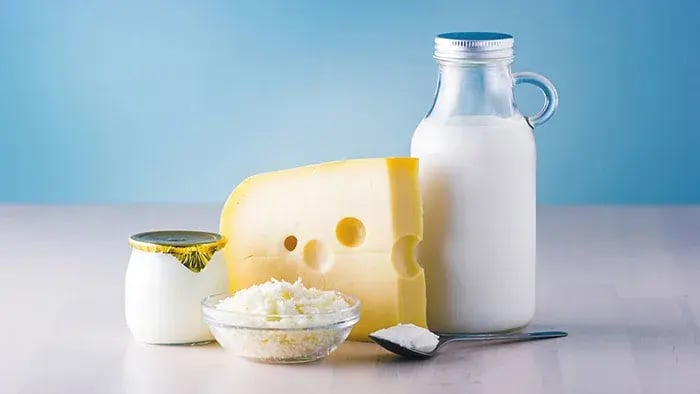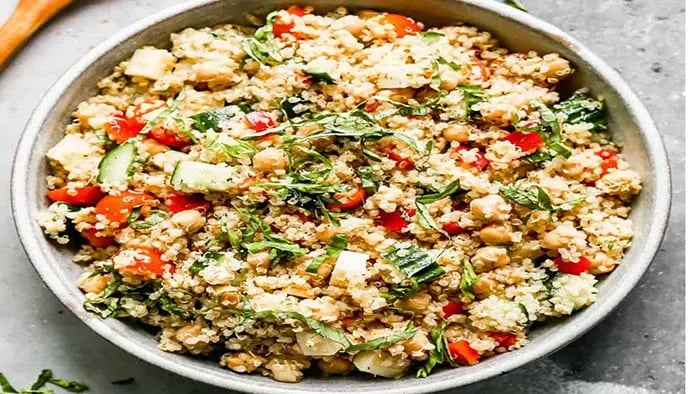- Nuts and nut butter
- Seeds
- Beans and legumes
- Dairy
- Quinoa
Meat is not everybody’s cup of tea, especially in a land as culturally and religiously diverse as India. Many fussy kids or those exceptionally sensitive to animals pick a fight when it comes to consuming animal protein like eggs, chicken, mutton and so on. And then there is the fact that there are many families which depend completely on a vegetarian or vegan diet due to religious or lifestyle reasons. But this cannot be the foundation of protein deficiency.
Since proteins are crucial to the formation and proper functioning of blood cells, bones, enzymes, muscles, and the immunity system, a deficiency of the same can cause stunted growth, muscle loss, swollen body parts, loss of appetite, poor immunity, brittle hair, nails, and poor skin health. To keep diseases like marasmus and kwashiorkor at bay, parents must take care that their infants and children meet their daily protein requirements.
Though protein requirements vary for individuals, based on age, sex, weight, and BMI, in general, toddlers aged 1 to 3 require 13 gms of protein daily, children aged 4 to 8 need 19 gms of protein per day, kids aged 9 to 13 need 34 gms of protein every day, while teen males aged 14 to 18 require 52 gms of protein and teen females of the same age group need 46 gms of protein daily.
Therefore, to ensure kids who follow a vegetarian diet have enough plant-based proteins every day, here is a quick guide on top vegetarian foods to add to your child’s diet.
Plant-Based Proteins to Add To Your Child's Diet
1. Nuts and nut butter

Nuts like almonds, peanuts, pistachios, and cashews are a good source of plant-based proteins for kids. A 30 gm serving of almonds provides 7 gms of protein, while the same amount of peanuts provides 9.5 gms of protein, a 30 gm serving of walnuts offers 4.5 gms of protein, while the same size serving of pistachios offers 46 gms of protein. As a result, not only do children get a decent source of proteins from nuts, but they also benefit from nut butter as they provide healthy fatty acids and proteins and pack a delicious, creamy taste. Include nuts more into your vegetarian kids’ diet in smoothies, salads, grain bowls, and curries.
2. Seeds
Unknown to many, seeds are a great source of protein in a few spoonfuls. Seeds like hemp seeds, pumpkin seeds, sunflower seeds, and flax seeds pack a punch of protein, along with a bunch of B vitamins, folic acid, phytosterols, phenolic compounds, and minerals. While three tablespoons of hemp seeds provide 9 gms of protein, pumpkin seeds provide 8 gms of protein for the same serving size, while sunflower seeds and flax seeds offer 6 and 5 gms of protein, respectively. Seeds make a great part of summer salads, trail mixes, and homemade granolas. They are also used as nutritious garnishing for a variety of dishes nowadays.
3. Beans and legumes
Beans and legumes are nutrient powerhouses and a great source of protein. Beans and legumes such as chickpeas, lentils, kidney beans, soybeans, and black beans possess high levels of protein. A cup of cooked soybeans provides 31.3 gms of protein, while a cup of black, kidney, and pinto beans provides around 15 gms of protein, chickpeas add 14.5 gms, and lentils almost 18 gms of protein per serving. This showcases how underrated beans and legumes are as plant-based protein sources, as they may often trump animal protein in terms of nutrition.
4. Dairy

Dairy has always been a rich source of protein for humans. In case your kids do not have a bone to pick with dairy, they can become your vegetarian kids’ best friend. Just a cup of skimmed milk provides 8.2 gms of protein, and a half cup serving of icecream provides 2.3 gms of protein, while a cup of Greek yogurt offers 17 gms of protein, and a half cup of mozzarella cheese provides 10 gms of protein. This shows how even small but twice-daily dairy consumption can lead to adequate plant-based protein consumption in your vegetarian child.
5. Quinoa

Quinoa is one of the very rare plant-based protein sources that contains all 20 amino acids, 11 of which can be produced within the human body and 9 of which must come externally from food. One cup of cooked quinoa provides around 8 gms of protein and 5 gms of fiber, making it a wonderful source of energy, satiety, and protein for children.
Protein is important not only for bodily functions but also as an essential source of energy for kids and young athletes, especially since it provides 4 kilocalories of energy per gram.
This makes protein a great food group for active kids and their parents to focus more on, instead of carbs, to keep a healthy, lean physique and good energy levels. And in order to keep protein deficiency and diseases at bay, parents should ensure these plant-based protein sources are a regular part of their vegetarian child’s diet.
Kaushiki Gangully is a content writing specialist with a passion for children's nutrition, education, and well-being. With more than five years of writing experience and a science-based background, she provides nuanced insights to help families raise happy, healthy kids. Kaushiki believes in making learning and healthy eating fun, empowering parents with practical, easy advice.
The views expressed are that of the expert alone.
The information provided in this content is for informational purposes only and should not be considered a substitute for professional medical advice, diagnosis, or treatment. Always seek the advice of your physician or another qualified healthcare provider before making any significant changes to your diet, exercise, or medication routines.
















